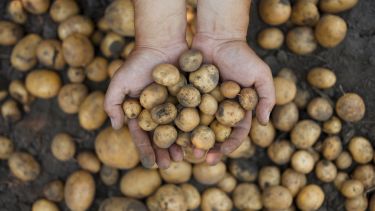From window boxes and growbags to greenhouses and allotments, scientists need your help to measure the amount of own-grown fruit and vegetables across the UK in the first national estimate of the 21st century.
The MYHarvest survey, which will be the first since the famous Dig for Victory campaign during the Second World War, will assess the important contribution green-fingered fruit and vegetable growers make to national food security and also reveal how much allotment and garden space we need in the future for the growing number of people living in our cities and towns.
Anyone who grows their own produce is invited to take part in the innovative citizen science project led by the University of Sheffield to help determine the yield of typical UK staple fruit and vegetable crops.
We currently have a poor understanding of how much own-grown food is produced so the research is key to providing an evidence base to support the use of land for growing spaces within our towns and cities.
Dr Jill Edmondson, a soil scientist and ecologist from the Department of Animal and Plant Sciences at the University of Sheffield, hopes the project will provide key insights into the ability of urban areas to contribute to UK food security.
“With over 80 per cent of the UK population living in cities or towns that are currently dependent on imported fruit and vegetables, it is important to understand how we can make our cities and towns more sustainable,” said Dr Edmondson.
“In this way, allotment holders and gardeners are helping us determine the extent to which own-grown food contributes to UK food security and sustainability. Urban greenspaces, for example, parks, allotments, gardens, wasteland, provide a multitude of options for areas where food crops can be grown.
“Anyone who grows their own fruit or veg, even if it’s only a small patch for carrots, can join in and simply log information on the MYHarvest website about what they are growing, where, and how much they have produced.”
MYHarvest is part of a wider research project that will study whether there are any barriers to using other urban greenspaces to increase the area of land used for own-grown food production for example some soils within greenspaces may contain high concentrations of pollutants such as heavy metals that could pose a risk to human health if used for food production.
Scientists will use the data gathered from people’s allotments, gardens and other spaces to produce estimates of the yields own-growers are able to achieve for typical UK fruit and vegetable crops.
The scientists will use this data to produce the first 21st century estimate of the amount of food grown in UK allotments as they are currently the largest areas of land used for own-growing in our cities and towns.
Own-growers are encouraged to capture and share their harvests – from scrumptious strawberries to juicy tomatoes - on Twitter and Instagram using the #MYHarvest
Roscoe Blevins, a research scientist in the MYHarvest team, said, “We are working with the National Allotment Society (NAS) and the Royal Horticultural Society (RHS) and hope to engage as many own-growers as possible. We’d love to hear from all gardeners, school groups, city farms, allotment owners and anyone who is growing their own fruit or vegetables – whether they are doing it for the first time or they are an accomplished green-fingered horticulturist.
“Every piece of information we receive from the nation’s own-growers will be important to the outcomes of this project and we hope taking part will also be a fun way for growers to get the most out of their planting as they compare their own findings with that of others around the country.”
The project is a Living with Environmental Change Fellowship funded by the Engineering and Physical Sciences Research Council (EPSRC).
Anne Adam, RHS Horticultural Advisor, said: “The RHS is pleased to support this exciting project. Good data about the amount of own-grown produce produced in the UK is hard to find and we hope this innovative project will help provide more information. We would encourage as many of our members and gardeners as possible to take part.”
Di Appleyard, from the NAS, said: “The NAS will be encouraging members and all plot-holders to engage with the My Harvest project and record their allotment haul this season. The information gathered will reinforce our message about the many benefits of allotment growing and help us to continue to grow the allotment movement.”

